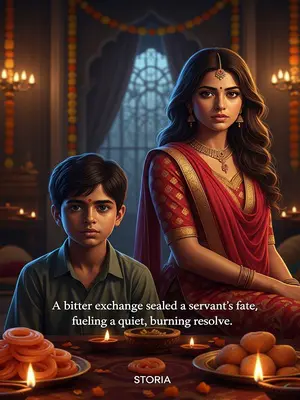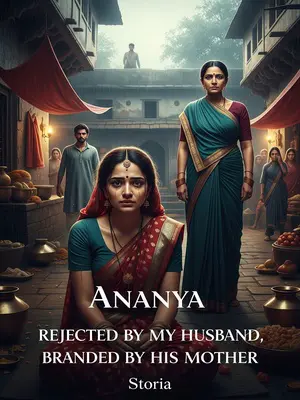Chapter 5: The Kurta and the Divorce Letter
The new kurta-pajama I ordered for Kabir half a month ago is finally ready. The books I asked the bookshop uncle to bring from Mumbai have arrived too—just the ones Kabir wanted.
When I get home, Kabir is as usual: cross-legged on the charpai, meditating. The firewood is chopped, vegetables washed, water in the pressure cooker nearly boiling. From the neighbour’s window, the TV blares some saas-bahu serial.
He takes the books, says nothing, cold as ever. When he sees the new clothes, he frowns, sneering: "Is it necessary? Jo bhi pehnoon, raat ko toh utarwa ke maar padti hai na, biwi madam?"
The pressure cooker whistles, drowning out the sting of his words. The smell of cooked masoor dal floats in the air, but I can’t taste it. Neighbourhood sounds drift in—doodhwala’s calls, children shouting over cricket—reminding me how small our world is.
The subtitles cheer:
[Haha! Told you, the male lead only cares about our dear heroine. No matter what the evil supporting character does, it’s useless!]
[Does the supporting character think a gift will make the male lead like her? He’s the MLA’s son! Who would want such cheap stuff? It just makes her look poor and crude!]
[The male lead’s sarcasm is so satisfying. Usually he gives in to the supporting character out of courtesy, and she really thinks he likes her?]
I clutch the new kurta, my heart pricked by a hundred tiny needles.
My parents died early. Most of the men’s clothes at home are old and worn. After healing Kabir, I wasn’t well-off. When I saw that pale blue cotton, I just thought how good he’d look in it. I couldn’t help buying it, completely forgetting I hadn’t bought new clothes for myself in years.
Though I’m a bit rough, I dare say I’ve never treated him badly. Only when he truly made me angry did I hit him a couple of times to teach him a lesson. That’s still better than those men in the colony who beat their wives every day.
But he’s like a thankless wolf—impossible to raise well. At first, he couldn’t do any chores, was even scared of goats. Reluctant to serve chai or water. When I asked him to help me bathe or change, he looked like he’d rather die—face cold, lips pressed tight, only his ears turning red with anger. As if he’d suffered a great humiliation. Always talking back. No matter what I did, I couldn’t warm him up. The belt didn’t bother him at all. He’d admit fault, but repeat the same thing next time. Just couldn’t teach him properly.
After seeing those subtitles, I finally understood why.
My heart is both sore and swollen, my chest aching a little.
A strange loneliness settles in the house, echoing between the bare walls. I stare at the sunlight slanting through the jali window and wish, for once, that my parents were still alive. They’d have known what to do with a husband like this—maybe they’d have laughed, maybe scolded me for acting above my station.
Suddenly, it all feels meaningless. I don’t want him anymore.
I throw the new kurta to the floor, my voice cold: "Fine, then don’t wear any from now on!"
The sound of the kurta hitting the ground is swallowed by the silence. Kabir’s eyes flicker—just for a moment, I think I see something in them, but it vanishes as quickly as the shadow of a passing crow.







